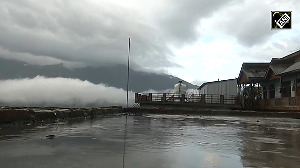Greece and the International Olympic Committee (IOC) said on Monday they were confident everything had been done to ensure the Athens Games are safe from a terrorist attack.
As preparations quickened for Friday's opening ceremony, six more athletes were thrust into the spotlight over drugs but IOC President Jacques Rogge hailed it as a mark of success that the battle against cheats was being won.
| |||||||||||
"Security has been, and remains, the number one priority at the Games. The IOC has full confidence in the Greek government," Rogge told an IOC meeting.
"These efforts are justified, as, going beyond the Games, what is at stake is protecting society, democracy, civilisation and freedom," he said in an apparent reference to the threat of attack by al Qaeda and other militant groups.
"We have taken all possible measures with the cooperation of friendly and allied countries. We have done what is humanly possible so that all athletes and visitors feel safe," Karamanlis said in a national television address.
"Greece is ready for successful Games under conditions of maximum security."
"MAXIMUM SECURITY"
A late spurt of all-out construction efforts had banished fears of half-finished arenas, said Games organisers, and a surge of ticket sales overturned predictions that the locals would quit town from August 13 to 29 to avoid Olympic "chaos".
Organisers aim to sell 3.4 million tickets by Friday and see demand accelerating towards an ultimate goal of 5.2 million.
Just 18 months ago, Rogge warned Athens it was running late.
Greek President Costis Stephanopoulos said the jibes his nation suffered in the hectic run-up to the Games still rankled: "I personally felt bitter when ... I came across a number of malevolent or ironical comments by others who were anticipating an organisational failure and rejoicing in advance."
The war on drugs put the focus on an American sprinter, two Greek baseball players, a Swiss cyclist, an Irish athlete and a Spanish canoeist.
Bernard Williams, a gold medal winner in the U.S. 4x100 relay team at the Sydney Olympics in 2000, tested positive for a banned substance at a meeting in Seville in June, said the U.S. Anti-Doping Agency (USADA).
Williams had received a warning but remained eligible to compete in Athens, USADA said.
"Hands up, I did it," Irish 10,000 metres runner Cathal Lombard, 28, was quoted as telling a newspaper, acknowledging a test had found banned erythropoietin, known as EPO, in his system. He withdrew from the Games.
Swiss cyclist Oscar Camenzind was also named and shamed after testing positive for the same blood-boosting substance, which enhances endurance.
The list of offenders grew with Spanish canoeist Jovino Gonzalez also testing positive for EPO. A Spanish Sports Council spokesman said Gonzalez had been dropped from the Olympic team.
Greece's Olympic authorities said Greek-American baseballers Derek Nicholson and Andrew James Brack had tested positive.
Athletes who fail a drugs test can expect to be banned for at least two years. The Athens Olympics are the first Games since the introduction of a global anti-doping code.
"(It) is an encouraging ... that it is becoming increasingly hard to cheat," said Rogge.
PASSIONS AND HOPE
A lovers' quarrel apparently prompted a Greek team member and her boyfriend to try to commit suicide within three days of each other from the same balcony, police said.
Michalis Chrisostomidis, 24, is suspected of leaping on Monday from the same balcony that his girlfriend and judo competitor Eleni Ioannou jumped from after a row on Saturday.
"This is a case of passion," said a police official. "Police are treating both cases as attempted suicides."
For few athletes at the Games does the ideal of the Olympics carry such emotional resonance as the Iraqis, who arrived saying their efforts in Athens might just prompt a ceasefire back home.
"Iraqis are very sports minded," said Tiras Odisho, a senior official in the 48-strong delegation. "During great soccer matches, you don't have any firing in the Iraq capital until the end of the match. There just might be a ceasefire."
The risk of a terrorist threat at the first Summer Olympics since the 2001 attacks on the United States has added at least $1.5 billion to the costs of the Games.
But while the biggest security operation in peacetime Europe is being mounted, the mood so far is serene.
Said Dutch swimmer Annabel Koster: "There's no sense in being worried about it all the time."








 © 2025
© 2025